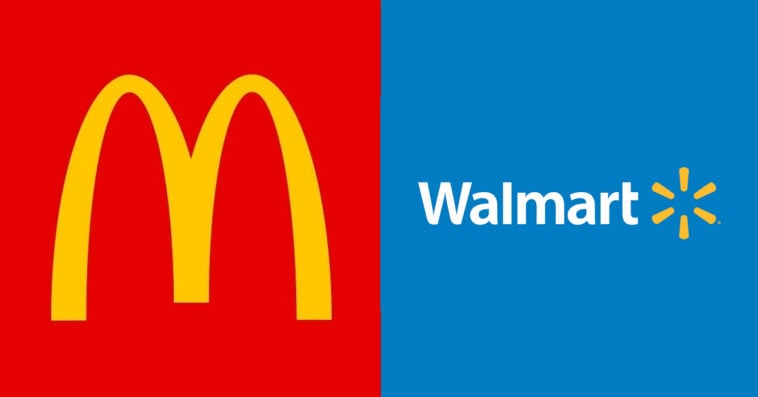A growing storm of consumer activism is set to hit two of America’s biggest names: McDonald’s and Walmart. From August 1 through the entire month, The People’s Union USA will spearhead a nationwide boycott targeting the three companies over alleged corporate tax avoidance, cuts to diversity programs, and systemic worker exploitation. Will this collective action force a change in corporate practices, or will it simply be a blip on the radar? Only time will tell. In the meantime, here’s everything you need to know about just how big these boycotts really are.
National Boycott Calls on Consumers to Support Independent Businesses Over Corporate Giants
A major consumer boycott targeting McDonald’s and Walmart, as well as Lowe’s, is set to happen for the entirety of next month. The action is organized by The People’s Union USA, a grassroots economic justice movement founded by activist John Schwarz. The campaign aims to pressure corporate giants over issues including tax avoidance, the rollback of diversity hiring programs, and alleged exploitation of workers.
Boasting over 360,000 TikTok followers and more than half a million on Instagram, Schwarz announced the initiative on social media, serving as a key voice in rallying support for coordinated economic resistance. This isn’t the first time Schwarz’s grassroots campaign has mobilized public sentiment. Previously, The People’s Union USA has orchestrated impactful 24-hour “economic blackouts” and strategic boycotts against major corporations like Amazon and Target, demonstrating their capacity to rally consumers for collective action.
For the entirety of August, the campaign’s ambitious objective is clear: deter consumers from spending their money at McDonald’s. Similar disruptive measures are also planned against Walmart and Lowe’s, aiming to significantly impact their monthly revenue. Beginning precisely on August 1st, this nationwide initiative calls upon every American to halt spending at these retail behemoths.
Beyond simply withholding funds, The People’s Union USA actively encourages a conscious shift in consumer behavior. Their guidance suggests postponing non-essential purchases during the boycott period or, more significantly, rerouting that spending directly to small, independent businesses.
As The People’s Union USA unequivocally states in their mission: “We are not a political party. We are not a protest. We are a movement of people, organizing to take back control of our economy, government and future of our country.”
Why McDonald’s Is Facing Renewed Boycott Pressure
McDonald’s, the world’s largest fast-food chain with an estimated 68 million daily customers, has increasingly found itself in the crosshairs of multiple boycott campaigns. While the global giant is no stranger to controversy, the intensity of recent backlash has placed the company under renewed scrutiny from both international and domestic critics.
Since 2023, McDonald’s has been targeted by the pro-Palestinian Boycott, Divestment, Sanctions (BDS) movement for its alleged business ties to Israel, sparking waves of protest across social media and at restaurant locations in various regions.
On the home front, the brand has also come under fire for its corporate decisions. In 2024, McDonald’s quietly rolled back many of its Diversity, Equity, and Inclusion (DEI) initiatives—a move that drew swift criticism from progressive advocacy groups who accused the company of retreating from its public commitments to equitable hiring and representation.
This year, The People’s Union USA published a list of corporations it deems harmful to economic and social equity. McDonald’s was named for what the group described as “known lobbying against wage increases,” as well as alleged tax avoidance and anti-worker policies.
With criticism mounting on several fronts, McDonald’s now finds itself facing a rare alignment of global and domestic opposition, potentially threatening both its reputation and customer loyalty.
What’s Driving the Push to Boycott Walmart
In April, Walmart became the focus of an aggressive boycott campaign launched by The People’s Union USA, which accuses the retail giant of representing “everything that’s wrong with corporate power in this country.”
According to Schwarz, the campaign is about more than just shopping habits—it’s about shifting the national conversation on who really pays for America’s public services. “Our mission is simple,” he said. “We want these corporations to start paying their fair share of taxes so the American people can finally be relieved of the burden of federal income tax.”
The group claims that massive corporations, such as Walmart, utilize tax loopholes and employ aggressive financial strategies to avoid paying their fair share, all while generating enormous profits. For The People’s Union USA, the Walmart boycott is a clear line in the sand: if corporations won’t contribute to the system fairly, consumers will hit them where it hurts—at the cash register.
The People’s Union USA Prepares for Next Phase of Economic Pushback
The economic resistance isn’t slowing down anytime soon. As The People’s Union USA continues its campaign against corporate power, the group has announced its next targets: Amazon, Uber, and PepsiCo. Starting in September, the movement plans to launch a new wave of boycotts aimed at holding these companies accountable for what it describes as exploitative labor practices, unfair taxation, and monopolistic behavior.
Source: Hindustan Times

